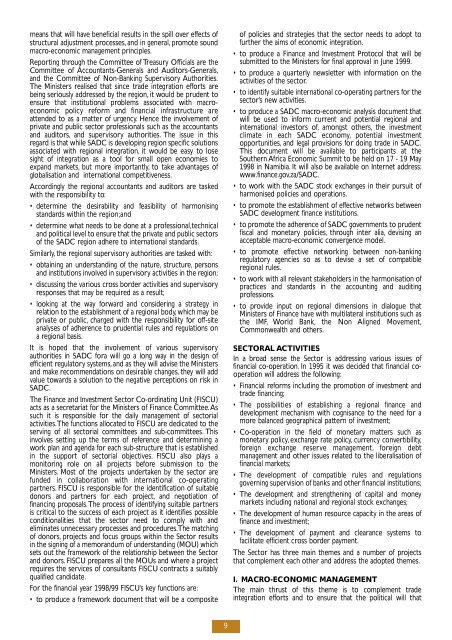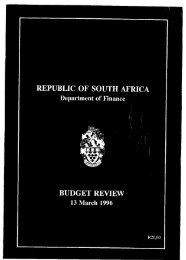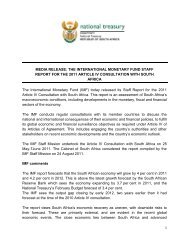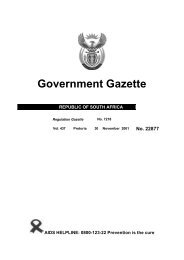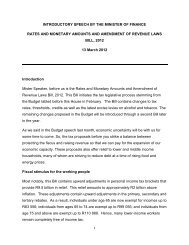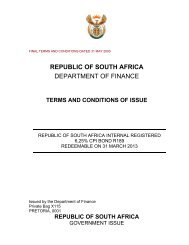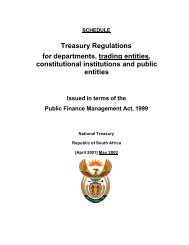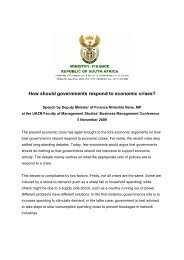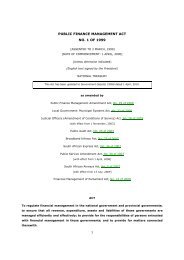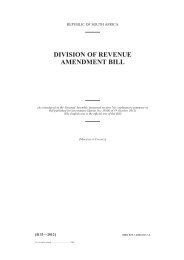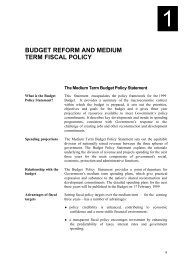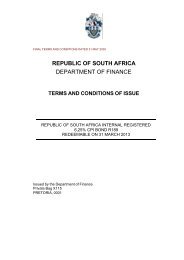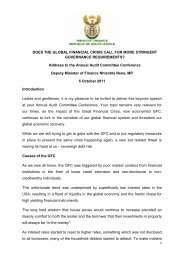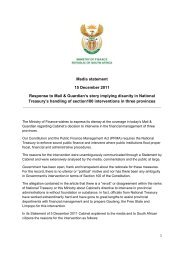1998 SOUTHERN AFRICA ECONOMIC ... - National Treasury
1998 SOUTHERN AFRICA ECONOMIC ... - National Treasury
1998 SOUTHERN AFRICA ECONOMIC ... - National Treasury
Create successful ePaper yourself
Turn your PDF publications into a flip-book with our unique Google optimized e-Paper software.
means that will have beneficial results in the spill over effects of<br />
structural adjustment pro c e s s e s ,and in general, p romote sound<br />
m a c ro-economic management principles.<br />
R e p o rting through the Committee of Tre a s u ry Officials are the<br />
Committee of Accountants-Generals and A u d i t o r s - G e n e r a l s ,<br />
and the Committee of Non-Banking Superv i s o ry A u t h o r i t i e s .<br />
The Ministers realised that since trade integration effo rts are<br />
being seriously add ressed by the re g i o n ,it would be prudent to<br />
e n s u re that institutional problems associated with macro -<br />
economic policy re form and financial infrastructure are<br />
attended to as a matter of urgency. Hence the invo l vement of<br />
private and public sector pro fessionals such as the accountants<br />
and auditors, and superv i s o ry authorities. The issue in this<br />
re g a rd is that while SADC is developing region specific solutions<br />
associated with regional integration, it would be easy to lose<br />
sight of integration as a tool for small open economies to<br />
expand marke t s , but more import a n t ly, to take advantages of<br />
globalisation and international competitive n e s s .<br />
A c c o rd i n g ly the regional accountants and auditors are taske d<br />
with the responsibility to:<br />
• determine the desirability and feasibility of harmonising<br />
s t a n d a rds within the re g i o n ;a n d<br />
• determine what needs to be done at a pro fe s s i o n a l ,t e c h n i c a l<br />
and political level to ensure that the private and public sectors<br />
of the SADC region adhere to international standard s .<br />
S i m i l a r ly, the regional superv i s o ry authorities are tasked with:<br />
• obtaining an understanding of the nature, s t r u c t u re, p e r s o n s<br />
and institutions invo l ved in superv i s o ry activities in the re g i o n ;<br />
• discussing the various cross border activities and superv i s o ry<br />
responses that may be re q u i red as a re s u l t ;<br />
• looking at the way fo r w a rd and considering a strategy in<br />
relation to the establishment of a regional body,which may be<br />
private or public, charged with the responsibility for off-site<br />
a n a lyses of adherence to prudential rules and regulations on<br />
a regional basis.<br />
It is hoped that the invo l vement of various superv i s o ry<br />
authorities in SADC fora will go a long way in the design of<br />
efficient re g u l a t o ry systems,and as they will advise the Ministers<br />
and make recommendations on desirable changes, t h ey will add<br />
value tow a rds a solution to the negative perceptions on risk in<br />
S A D C.<br />
The Finance and Investment Sector Co-ordinating Unit (FISCU)<br />
acts as a secretariat for the Ministers of Finance Committee.A s<br />
such it is responsible for the daily management of sectorial<br />
a c t i v i t i e s .The functions allocated to FISCU are dedicated to the<br />
s e rving of all sectorial committees and sub-committees. T h i s<br />
i nvo l ves setting up the terms of re fe rence and determining a<br />
work plan and agenda for each sub-structure that is established<br />
in the support of sectorial objective s . FISCU also plays a<br />
monitoring role on all projects befo re submission to the<br />
M i n i s t e r s .Most of the projects undert a ken by the sector are<br />
funded in collaboration with international co-operating<br />
p a rt n e r s .FISCU is responsible for the identification of suitable<br />
donors and partners for each pro j e c t , and negotiation of<br />
financing pro p o s a l s .The process of identifying suitable part n e r s<br />
is critical to the success of each project as it identifies possible<br />
conditionalities that the sector need to comply with and<br />
eliminates unnecessary processes and pro c e d u re s .The matching<br />
of donors, p rojects and focus groups within the Sector re s u l t s<br />
in the signing of a memorandum of understanding (MOU) which<br />
sets out the framework of the relationship between the Sector<br />
and donors. FISCU pre p a res all the MOUs and where a pro j e c t<br />
re q u i res the services of consultants FISCU contracts a suitably<br />
qualified candidate.<br />
For the financial year <strong>1998</strong>/99 FISCU’s key functions are :<br />
• to produce a framework document that will be a composite<br />
of policies and strategies that the sector needs to adopt to<br />
f u rther the aims of economic integration.<br />
• to produce a Finance and Investment Protocol that will be<br />
submitted to the Ministers for final ap p roval in June 1999.<br />
• to produce a quart e r ly newsletter with information on the<br />
activities of the sector.<br />
• to identify suitable international co-operating partners for the<br />
s e c t o r ’s new activities.<br />
• to produce a SADC macro-economic analysis document that<br />
will be used to inform current and potential regional and<br />
international investors of, amongst others, the inve s t m e n t<br />
climate in each SADC economy, potential inve s t m e n t<br />
o p p o rt u n i t i e s ,and legal provisions for doing trade in SADC.<br />
This document will be available to participants at the<br />
Southern Africa Economic Summit to be held on 17 - 19 May<br />
<strong>1998</strong> in Namibia. It will also be available on Internet add re s s :<br />
w w w. f i n a n c e. gov. z a / S A D C.<br />
• to work with the SADC stock exchanges in their pursuit of<br />
harmonised policies and operations.<br />
• to promote the establishment of effe c t i ve networks betwe e n<br />
SADC development finance institutions.<br />
• to promote the adherence of SADC governments to prudent<br />
fiscal and monetary policies, t h rough inter alia, d evising an<br />
acceptable macro-economic convergence model.<br />
• to promote effe c t i ve networking between non-banking<br />
re g u l a t o ry agencies so as to devise a set of compatible<br />
regional rules.<br />
• to work with all re l evant stakeholders in the harmonisation of<br />
practices and standards in the accounting and auditing<br />
p ro fe s s i o n s .<br />
• to provide input on regional dimensions in dialogue that<br />
Ministers of Finance have with multilateral institutions such as<br />
the IMF, World Bank, the Non Aligned Move m e n t ,<br />
C o m m o n wealth and others.<br />
S E C TORAL AC T I V I T I E S<br />
In a broad sense the Sector is add ressing various issues of<br />
financial co-operation. In 1995 it was decided that financial cooperation<br />
will add ress the fo l l ow i n g :<br />
• Financial re forms including the promotion of investment and<br />
trade financing;<br />
• The possibilities of establishing a regional finance and<br />
d evelopment mechanism with cognisance to the need for a<br />
m o re balanced geographical pattern of inve s t m e n t ;<br />
• Co-operation in the field of monetary matters such as<br />
m o n e t a ry policy, exchange rate policy, c u rrency conve rt i b i l i t y,<br />
fo reign exchange re s e rve management, fo reign debt<br />
management and other issues related to the liberalisation of<br />
financial marke t s ;<br />
• The development of compatible rules and re g u l a t i o n s<br />
governing supervision of banks and other financial institutions;<br />
• The development and strengthening of capital and money<br />
m a r kets including national and regional stock exchanges;<br />
• The development of human re s o u rce capacity in the areas of<br />
finance and inve s t m e n t ;<br />
• The development of payment and clearance systems to<br />
facilitate efficient cross border pay m e n t .<br />
The Sector has three main themes and a number of pro j e c t s<br />
that complement each other and add ress the adopted themes.<br />
I . M AC RO-<strong>ECONOMIC</strong> MANAG E M E N T<br />
The main thrust of this theme is to complement trade<br />
integration effo rts and to ensure that the political will that<br />
9


